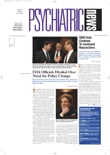Virginia, where APA's headquarters is located, gave gay-rights and other activists a rare victory in February when it passed a law undoing its status as the only state that prohibits businesses from offering health insurance to domestic partners of employees.
The vote came during a brief legislative session in which state lawmakers passed several pieces of legislation to limit the rights of gay and lesbian citizens.
The bill passed in large part because it never mentioned gay people. The legislation, titled Health Insurance; Coverage for Certain Persons (SB 1338), was presented as being a business-friendly move rather as a civil-rights issue.
The bill allows health and group accident insurance to be offered “to any class of persons as may mutually be agreed upon by the insurer and the group policyholder.”
APA is the group policyholder in the case of its insured employees. It was one of several companies and organizations that argued in favor of the change in Virginia law.
APA was distressed to learn when it moved to Arlington, Va., in December 2002 that it had lost the ability to continue allowing its employees to add a domestic partner to their health insurance coverage.
APA testified before a Virginia House of Delegates committee last year after the bill's original introduction (Psychiatric News, March 5, 2004). The House of Delegates passed the 2004 bill by one vote—as it did again in February—but the earlier version died in the state Senate when the session ended without a vote on the bill.
When APA learned that the bill had been reintroduced, Medical Director James H. Scully Jr., M.D., sent a letter to Sen. William Wampler, chair of the committee with jurisdiction over the bill, strongly urging him to support the legislation. As other supporters of the bill had been doing, Scully emphasized the business arguments, noting that the Virginia regulation barring employers from offering domestic-partner benefits “took away a key benefit we use to attract and retain good employees.... From a business perspective, we are now at a competitive disadvantage to professional associations in [neighboring] Maryland and Washington, D.C., that are able to offer such benefits.”
Scully also emphasized that “APA has been hindered by unwarranted government intrusion into how it competes in the employment marketplace”—a statement that in all likelihood resonated with Virginia's extremely pro-business legislature. Passage of the bill, he said,“ is good for business, good for the [state], and good for Virginians and their health.”
